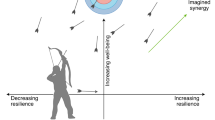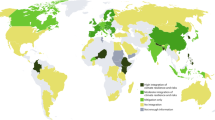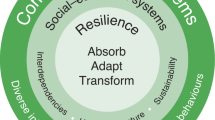Abstract
The resilience concept requires greater attention to human livelihoods if it is to address the limits to adaptation strategies and the development needs of the planet's poorest and most vulnerable people. Although the concept of resilience is increasingly informing research and policy, its transfer from ecological theory to social systems leads to weak engagement with normative, social and political dimensions of climate change adaptation. A livelihood perspective helps to strengthen resilience thinking by placing greater emphasis on human needs and their agency, empowerment and human rights, and considering adaptive livelihood systems in the context of wider transformational changes.
This is a preview of subscription content, access via your institution
Access options
Subscribe to this journal
Receive 12 print issues and online access
$209.00 per year
only $17.42 per issue
Buy this article
- Purchase on Springer Link
- Instant access to full article PDF
Prices may be subject to local taxes which are calculated during checkout
Similar content being viewed by others
References
Adger, W. N. et al. Resilience implications of policy responses to climate change. WIREs Clim. Change 2, 757–766 (2011).
Bahadur, A. V., Ibrahim, M. & Tanner, T. M. Characterising resilience: Unpacking the concept for tackling climate change and development. Clim. Dev. 5, 55–65 (2013).
Holling, C. S. in Engineering within Ecological Constraints (ed. Schulze, P. C.) Ch. 2 (National Academies Press, 1996).
Folke, C. Resilience: The emergence of a perspective for social–ecological systems analyses. Glob. Environ. Change 16, 253–267 (2006).
Brand, F. S. & Jax, K. Focusing the meaning(s) of resilience: Resilience as a descriptive concept and a boundary object. Ecol. Soc. 12, 23 (2007).
Tanner, T. M. & Horn-Phathanothai, L. Climate Change and Development (Routledge, 2014).
O'Brien, K. L. & Wolf, J. A values-based approach to vulnerability and adaptation to climate change. WIREs Clim. Change 1, 232–242 (2010).
Leach, M. (ed.) Reframing Resilience: A Symposium Report (STEPS Centre, 2008).
Cote, M. & Nightingale, A. Resilience thinking meets social theory: Situating social change in socio-ecological systems (SES) research. Prog. Hum. Geogr. 36, 475–489 (2012).
Tanner, T. M. & Allouche, J. Towards a new political economy of climate change. IDS Bull. 43, 1–14 (2011).
Dow, K. et al. Limits to adaptation. Nature Clim. Change 3, 305–307 (2013).
Beymer-Farris, B. A., Bassett, T. J. & Bryceson, I. in Resilience in the Cultural Landscape (eds Plieninger, T. & Bieling, C.) 283–299 (Cambridge Univ. Press, 2012).
Béné, C., Wood, R., Newsham, A. & Davies, M. Resilience: New Utopia or New Tyranny Working Paper 405 (IDS, 2012).
Wrathall, D. et al. Migration and climate rigidity traps: Socio-ecological possibilism and resource politics in Honduras and Peru. Ann. Assoc. Am. Geogr. 104, 292–304 (2014).
Ribot, J. C. in Social Dimensions of Climate Change: Equity and Vulnerability in a Warming World (eds Mearns, R. & Norton, A.) 47–74 (World Bank, 2011).
Miller, F. et al. Resilience and vulnerability: Complementary or conflicting concepts? Ecol. Soc. 15, 11 (2010).
Cannon, T. & Muller-Mahn, D. Vulnerability, resilience and development discourses in context of climate change. Nat. Hazards 55, 621–635 (2010).
O'Brien, K. Responding to environmental change: A new age for human geography? Prog. Hum. Geogr. 35, 542–549 (2011).
Brown, K. Global environmental change I — A social turn for resilience? Prog. Hum. Geogr. 38, 107–117 (2014).
Hayward, B. Rethinking resilience: reflections on the Earthquakes in Christchurch, New Zealand, 2010 and 2011. Ecol. Soc. 18, 37 (2013).
Weichselgartner, J. & Kelman, I. Geographies of resilience: Challenges and opportunities of a descriptive concept. Prog. Hum. Geog. http://dx.doi.org/10.1177/0309132513518834 (2014).
Marschke, M. J. & Berkes, F. Exploring strategies that build livelihood resilience: a case from Cambodia. Ecol. Soc. 11, 42 (2005).
Speranza, C. I., Wiesmann, U. & Rist, S. An indicator framework for assessing livelihood resilience in the context of social–ecological dynamics. Glob. Environ. Change 28, 109–119 (2014).
Chambers, R. & Conway, G. R. Sustainable Rural Livelihoods: Practical Concepts for the 21st Century (IDS, 1991).
Ashley, C. & Carney, D. Sustainable Livelihoods: Lessons from Early Experience (DFID, 1999).
Ellis, F. Household strategies and rural livelihood diversification. J. Dev. Studies, 35, 1–38 (1998).
Davidson, D. J. We still have a long way to go, and a short time to get there: A response to Fikret Berkes and Helen Ross. Soc. Nat. Resour. 26, 21–24 (2013).
Westley, F. R. et al. A theory of transformative agency in linked social-ecological systems. Ecol. Soc. 18, 27 (2013).
Aldrich, D. Building Resilience: Social Capital in Post-Disaster Recovery (Univ. Chicago Press, 2012).
Palmer, P. I. & Smith, M. J. Model human adaptation to climate change. Nature 512, 365–6 (2014).
Sen, A. Elements of a theory of human rights. Phil. Publ. Aff. 32, 315–356 (2004).
Bronen, R. in Humanitarian Crises and Migration (eds Martin, S., Weerasinghe, S. & Taylor, A.) 221–242 (Routledge, 2014).
Molyneux, M. D. & Lazar, S. Doing the Rights Thing: Rights-Based Development and Latin American NGOs (ITDG, 2003).
Satterthwaite, D. & Mitlin, D. Reducing Urban Poverty in the Global South (Routledge, 2014).
Pelling, M. Adaptation to Climate Change: From Resilience to Transformation (Routledge, 2010).
Brown, K. & Westaway, E. Agency, capacity, and resilience to environmental change: Lessons from human development, well-being, and disasters. Annu. Rev. Environ. Resour. 36, 321–342 (2011).
Welsh, M. Resilience and responsibility: governing uncertainty in a complex world. Geogr. J. 180, 15–26 (2014).
Smith, M. S., Horrocks, L., Harvey, A. & Hamilton, C. Rethinking adaptation for a 4 °C world. Phil. Trans. R. Soc. A 369, 196–216 (2011).
O'Brien, K. Global environmental change II: From adaptation to deliberate transformation. Prog. Hum. Geogr. 36, 667–676 (2012).
Kates, R. W., Travis, W. R. & Wilbanks, T. J. Transformational adaptation when incremental adaptations to climate change are insufficient. Proc. Natl Acad. Sci. USA 109, 7156–7161 (2012).
Park, S. E. et al. Informing adaptation responses to climate change through theories of transformation. Glob. Environ. Change 22, 115–126 (2012).
Walker, B., Holling, C. S., Carpenter, S. R. & Kinzig, A. Resilience, adaptability and transformability in social–ecological systems. Ecol. Soc. 9, 5 (2004).
Lebel, L. et al. Governance and the capacity to manage resilience in regional social–ecological systems. Ecol. Soc. 11, 19 (2006).
ISSC/UNESCO World Social Science Report 2013: Changing Global Environments (OECD/UNESCO, 2013).
Human Development Report 2014: Vulnerability and Resilience (UN Development Programme, 2014).
Lewis, D. Non-Governmental Organizations, Management and Development (Routledge, 2014).
Acknowledgements
The authors acknowledge support of the Munich Re Foundation and other participants of the 2013 Resilience Academy meeting, which led to the development of this paper.
Author information
Authors and Affiliations
Contributions
T.T., D.L., D.W. and R.B. led the drafting of the text with inputs from all other authors. All authors contributed to the intellectual content.
Corresponding author
Ethics declarations
Competing interests
The authors declare no competing financial interests.
Rights and permissions
About this article
Cite this article
Tanner, T., Lewis, D., Wrathall, D. et al. Livelihood resilience in the face of climate change. Nature Clim Change 5, 23–26 (2015). https://doi.org/10.1038/nclimate2431
Received:
Accepted:
Published:
Issue Date:
DOI: https://doi.org/10.1038/nclimate2431
This article is cited by
-
Catching Dory: selling aquarium fish supports coastal livelihoods in Indonesia
npj Ocean Sustainability (2024)
-
Investigating the “Thief in the Night”: The Reproduction and Erosion of Indigenous Forms of Social Resilience in Rural Fiji
Human Ecology (2024)
-
Dry growing seasons predicted Central American migration to the US from 2012 to 2018
Scientific Reports (2023)
-
Impact of livelihood capital and rural site conditions on livelihood resilience of farm households: evidence from contiguous poverty–stricken areas in China
Environmental Science and Pollution Research (2023)
-
Resilient Livelihood Styles: An enriched perspective on household livelihood resilience in the sensitive natural environments of Indonesia
Regional Environmental Change (2023)



